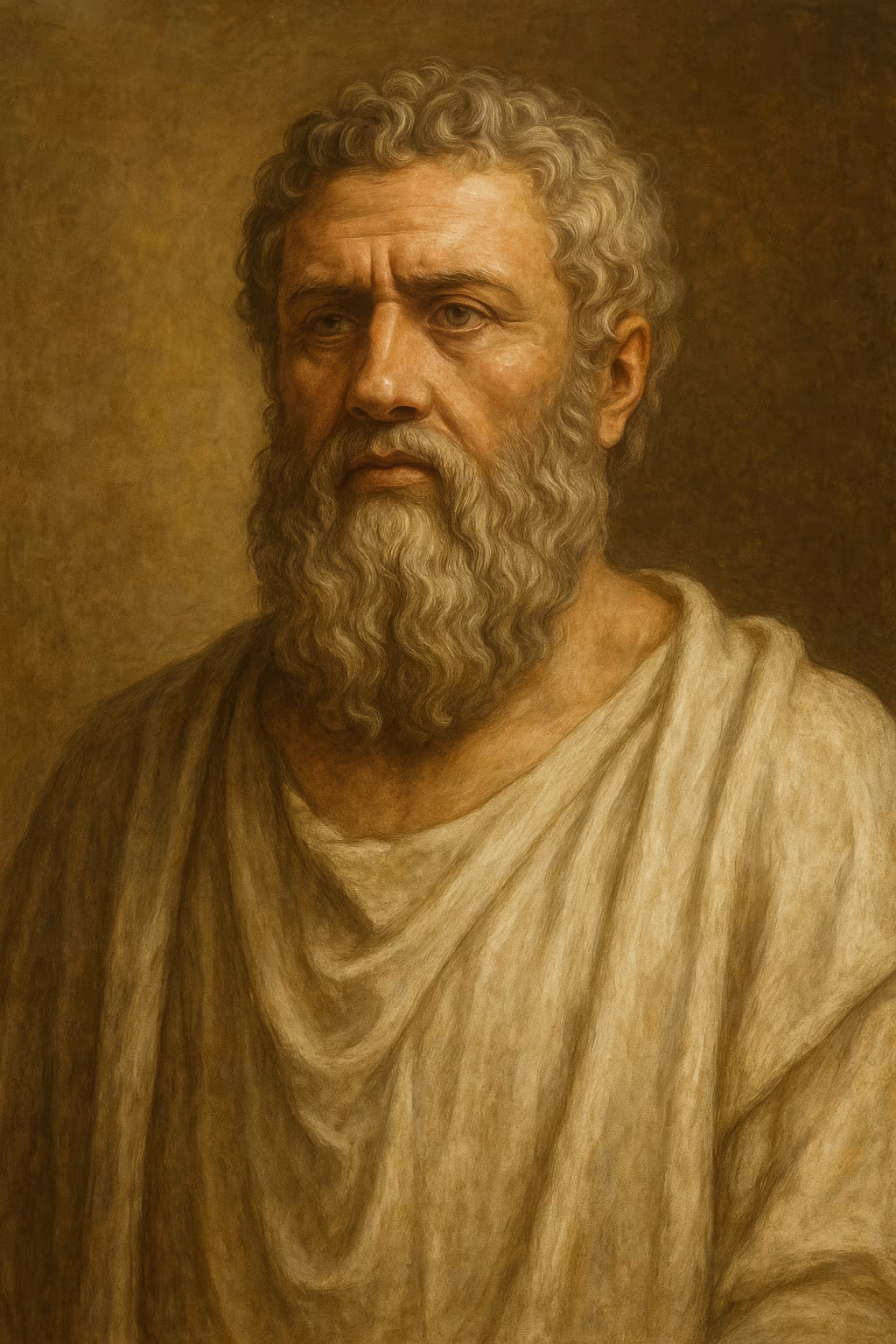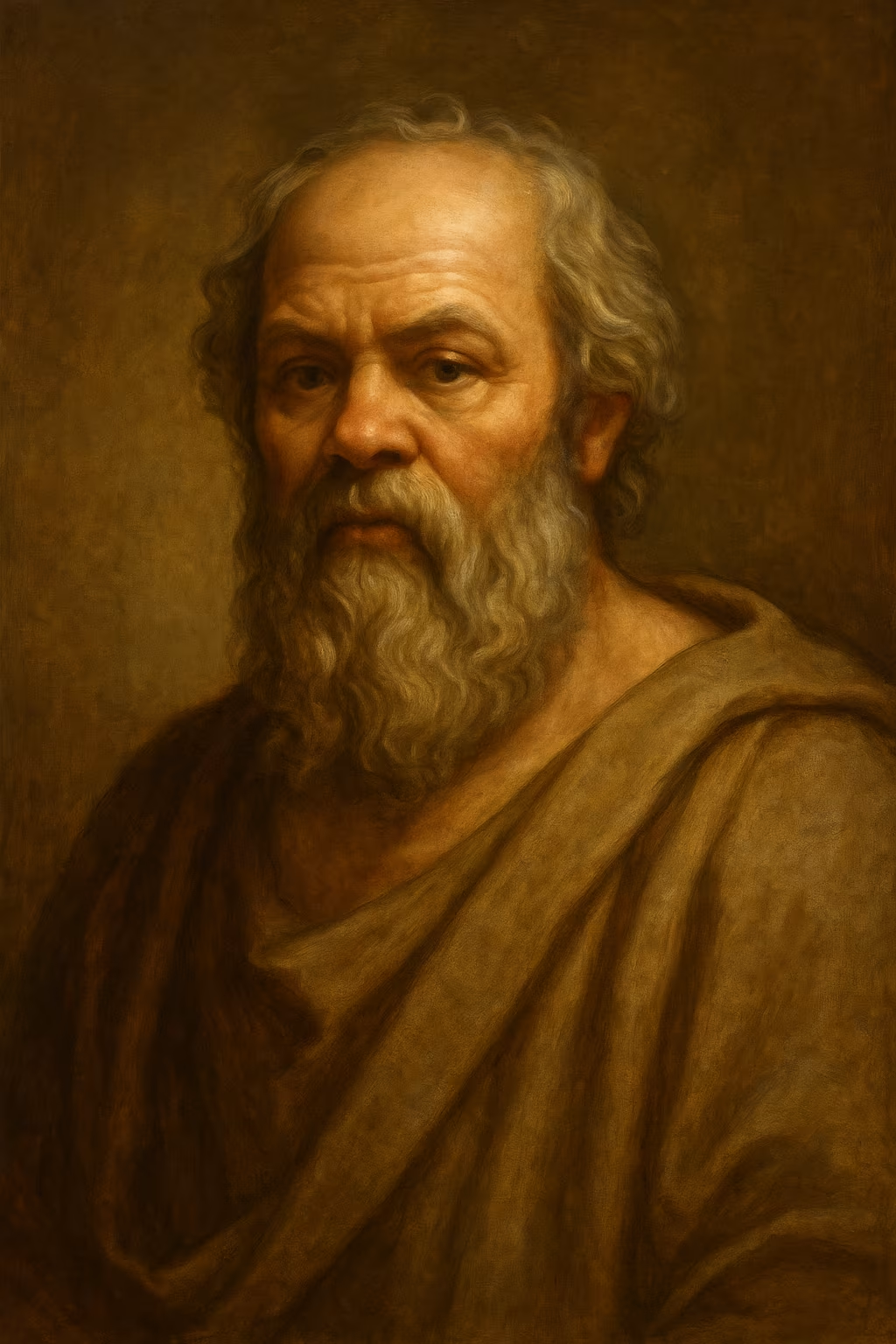Plato (428/427 – 348/347 BCE)
Quick Summary
Plato (428/427 – 348/347 BCE) was a philosopher and major figure in history. Born in Athens or Aegina, ancient Greece, Plato left a lasting impact through Founded the Academy in Athens, prototype for Western philosophical institutions.

Birth
428 BC Athens or Aegina, ancient Greece
Death
348 BC Athens, ancient Greece
Nationality
Athenian
Occupations
Complete Biography
Origins And Childhood
Plato was born into an aristocratic Athenian household connected to leading political families such as Critias and Charmides. Growing up during the Peloponnesian War, he experienced civic upheaval and the decline of traditional institutions. Educated in poetry, athletics, and music, the young Aristocles—his birth name—seemed destined for political office. Encountering Socrates during adolescence redirected his ambitions: the philosopher’s ironic questioning, moral rigor, and simple lifestyle convinced him to pursue philosophy. Socrates’ execution in 399 BCE sealed Plato’s commitment to defending his teacher and seeking stable foundations for justice. Ancient sources like Diogenes Laertius describe him as contemplative, drawn to universal principles and wary of the factionalism that plagued the polis.
Historical Context
Fourth-century Athens emerged weakened from war with Sparta. Regimes oscillated between restored democracy and oligarchic rule by the Thirty Tyrants. The wider Greek world was fragmented, with Macedon’s power rising. Sophists promoted pragmatic rhetoric for political success, while rival schools—pythagoreans, socratics, isocrateans—offered competing visions of virtue. Mathematical, medical, and astronomical advances multiplied. Plato’s dialogues address this climate of uncertainty, challenging relativism and searching for rational, stable grounds for knowledge. His philosophical project answers the crisis of civic institutions by proposing a rigorous education for leaders and citizens alike.
Formation And Influences
After Socrates’ death, Plato spent years traveling and studying. He stayed with Euclides in Megara, explored mathematics in Cyrene under Theodorus, and met Archytas in Tarentum, absorbing pythagorean harmonics. A journey to Egypt exposed him to ancient religious practices and geometry. Back in Athens, he gathered Socratic teachings, engaged medical, musical, and political debates, and tested sophistic rhetoric against the quest for definitions. Early dialogues extend Socratic moral inquiry while sketching themes of virtue, knowledge, and the soul. Works such as the Apology, Crito, and Protagoras defend Socrates and set forth a pedagogy of questioning.
Travels And Encounters
Plato’s three Sicilian journeys shaped his views. Around 388 BCE he met Dionysius I of Syracuse through Dion, hoping to realize a philosopher-king. The venture failed, leading to his temporary enslavement on Aegina before being ransomed by the Cyrenian Anniceris. He returned to Syracuse under Dionysius II with Dion’s support, again seeking reform. Court intrigue and distrust ended the experiment, persuading Plato that political transformation required collective education rather than the conversion of a single ruler. He collaborated with Italian pythagoreans, exchanged ideas on astronomy with Eudoxus, and worked with mathematicians like Theaetetus and Philip of Opus. These travels reinforced his conviction that philosophy needs institutional grounding.
Foundation Of The Academy
Back in Athens, Plato founded the Academy near the grove of Akademos around 387 BCE. The school united philosophers, mathematicians, astronomers, and scientists in interdisciplinary study. Instruction combined lectures, debates, and research on geometry, arithmetic, harmonics, and cosmology, guiding students from the exact sciences to dialectic. Figures such as Aristotle, Speusippus, Xenocrates, Heraclides, and women philosophers like Lastheneia and Axiothea trained there. The Academy functioned as an autonomous intellectual community with its own sanctuary and library. Plato composed major dialogues—the Phaedo, Symposium, Republic—as teaching tools and doctrinal syntheses. The institution endured until 86 BCE and set a precedent for later philosophical schools.
Philosophy And Dialogues
Plato’s corpus comprises roughly thirty dialogues. Early aporetic works (Laches, Charmides, Lysis) end in acknowledged ignorance. Middle dialogues (Phaedo, Symposium, Republic) present the theory of Forms, the tripartite soul, the Good, and dialectic pedagogy. The Republic outlines a just city governed by philosophers, while the Symposium charts the ascent of love from desire to contemplation of Beauty itself. The Phaedo investigates the soul’s immortality. Later works (Parmenides, Sophist, Statesman, Philebus, Timaeus) refine his ideas, probing participation, being and non-being, cosmology, and the role of measure. The Laws, composed late, offers practical legislation for the city of Magnesia. Plato favored dialogue to stage opposing arguments and emphasize philosophy as an ongoing, collaborative quest.
Political Engagement
Although wary of Athenian politics, Plato never abandoned institutional reflection. Letters attributed to him reveal disappointment with both Syracusan tyrants and Athenian demagogues. The Republic imagines an ideal city structured by justice, division of labor, guardian education, and communal property for rulers. The Statesman (Politicus) describes political expertise as a science of measure, while the Laws design a workable constitution blending reason, tradition, and civic religion. Plato sought to reconcile philosophical wisdom with stable institutions, channeling his activism into education and the shaping of elites rather than coups or demagoguery.
Legacy
Plato’s influence spans antiquity, the Middle Ages, and modernity. Successors like Speusippus and Xenocrates continued the Academy. Aristotelianism developed in critical dialogue with Platonism. Middle Platonism and Neoplatonism (Plotinus, Porphyry, Proclus) reinterpreted the Forms in hierarchical metaphysics. Christian thinkers (Augustine, Gregory of Nyssa) adapted his ideas about God and the soul. Renaissance humanists (Ficino, Pico della Mirandola) translated and commented on his works. Enlightenment philosophers, German idealists, analytic philosophers, and social theorists have engaged his theory of ideas, justice, and art. His dialogues shape literature, theater, and pedagogy, and remain central to debates on democracy, technocracy, and utopia.
Achievements and Legacy
Major Achievements
- Founded the Academy in Athens, prototype for Western philosophical institutions
- Developed the theory of Forms and dialectic as pathways to true knowledge
- Formulated the just city and philosopher-ruler in the Republic
- Composed dialogues that became foundational texts for metaphysics, ethics, education, and politics
Historical Legacy
Plato remains a central reference for Western thought: his dialogues have shaped metaphysics, inspired political utopias, nourished philosophical pedagogy, and influenced theology, science, and literature for more than two millennia.
Detailed Timeline
Major Events
Birth
Born in Athens or on Aegina into an aristocratic family linked to Athenian leadership
Trial of Socrates
Witnesses his teacher’s condemnation, a turning point for his philosophical mission
First journey to Sicily
Visits Dionysius I in Syracuse and encounters pythagorean circles
Foundation of the Academy
Establishes a permanent philosophical school in the gymnasium of Akademos
Second mission to Syracuse
Attempts to educate Dionysius II as a philosopher-king with Dion’s assistance
Circulation of the Republic
Releases a comprehensive synthesis on justice, education, and metaphysics
Death
Dies in Athens, leaving Speusippus to lead the Academy
Geographic Timeline
Famous Quotes
"No one is willingly unjust."
"Music gives a soul to the universe, wings to the mind, and life to everything."
"Justice means minding one’s own business and not meddling with what is not one’s own."
External Links
Frequently Asked Questions
When was Plato born and when did he die?
Ancient testimonies place his birth around 428/427 BCE and his death in 348/347 BCE, both in Athens during the classical Greek era.
How was Plato connected to Socrates?
Plato was among Socrates’ closest disciples; he witnessed the trial, recorded the Apology, and made Socrates the principal speaker of his philosophical dialogues.
What is Plato’s theory of Forms?
The theory of Forms posits immutable intelligible entities that serve as perfect models for sensible realities and ground the possibility of true knowledge.
Why did Plato found the Academy?
He founded the Academy around 387 BCE to institutionalize inquiry into philosophy, mathematics, and astronomy, gathering a community devoted to truth-seeking and the training of leaders.
Which works of Plato are the most influential?
The Republic, Symposium, Phaedo, Timaeus, Sophist, Statesman, and Laws stand out among his major dialogues, spanning ethics, politics, metaphysics, aesthetics, and cosmology.
Sources and Bibliography
Primary Sources
- Platon — République
- Platon — Banquet
- Platon — Timée
- Platon — Lettres
- Diogène Laërce — Vies et doctrines des philosophes illustres
Secondary Sources
- Giovanni Reale — Histoire de la philosophie ancienne, tome II ISBN: 9782220042247
- Luc Brisson — Platon ISBN: 9782020329356
- Monique Dixsaut — Métamorphoses de la dialectique platonicienne ISBN: 9782130548963
- Christopher Rowe — Plato and the Art of Philosophical Writing ISBN: 9780521604386
- Gail Fine — The Possibility of Inquiry: Meno’s Paradox from Socrates to Sextus ISBN: 9780198747994
External References
See Also
Related Figures
Specialized Sites
Batailles de France
Discover battles related to this figure
Dynasties Legacy
Coming soonExplore royal and noble lineages
Timeline France
Coming soonVisualize events on the chronological timeline
